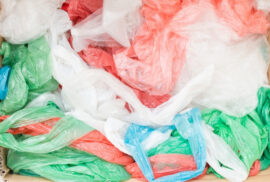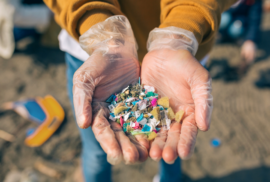Polly Products turns milk jugs into park benches

Simple and functional, the humble park bench rarely attracts a second look. It’s a ubiquitous feature of our public spaces and streetscapes. No wonder most passersby take it for granted.
But lately bench buyers are paying a lot of attention to those made by Polly Products, a manufacturer in the town of Mulliken, 20 miles west of Lansing. And that’s because its simple seats are fashioned from recycled milk jugs–just like the one in your refrigerator. Polly Products uses up to 2,024 of them to create one bench, depending on which of its 13 styles you want. The company also manufactures picnic tables, bike racks, waste bins, and–new this year–bat houses, using milk jugs and/or five-gallon pails from the restaurant industry.
These containers originate in community recycling programs across the state. “Everything we make is with post-consumer plastic–stuff we keep out of landfills,” says company president Kevin Dingle.
They’re made of high-density polyethylene (HDPE), a petroleum-based plastic that is strong, durable and long-lived–ideal attributes for outdoor furniture. You see, a typical pine park bench might last five years before rotting; these benches will stand for decades, if not longer, says Kevin. Indeed, studies estimate HDPE bottles take 450 years to break down.
An investment that lasts
Though the benches cost more than traditional pine or metal models, their durability is appealing to buyers, especially local governments. “Lots of municipalities are starting to buy more and more,” says Kevin. “We’re seeing them come back as they replace pine benches because they pay for themselves quickly.”
Their green nature is also a selling point as earth-friendly consumerism spreads. “Companies are seeing there is a market for recycled products,” he adds. “People want a product that they can say, ‘I kept this out of the landfill.'”
The furniture’s popularity has helped his company, founded in 2001, steadily grow. It’s part of Michigan’s surging $24.3 billion recycling, reuse and recovery industry. One of the industry’s 2,000 companies, Polly Products represents a third stop in the 3R cycle, coming after plastic has been recovered by a waste-management firm and then recycled by another that sorts, cleans and shreds the jugs and pails into small, thin chips called “flakes.”
The Mulliken manufacturer’s processes entail several large machines plus about 40 employees. They work to melt the flakes into a liquid, force it into the molds and then refine and assemble the resulting parts into whatever furniture items are being produced at that time.
Two million pounds of plastic
With the exception of coloring, sunblock and binding agents added at the start of the process and stainless steel screws used to fasten parts, the finished product is 100% recycled material. It reflects the company’s eco-friendly operational approach.
“All of our surplus goes back into the process–shavings from the saw line are saved and sent out to be pelletized and sent back to us,” says Kevin. “Everything that comes in here leaves only in a product.” Meanwhile, the boxes in which the flakes are transported and the pallets that carry the boxes are picked up and reused to deliver additional batches of flakes.
This company annually recycles about 2 million pounds of plastic. The resulting furniture is sold to customers in every state and many countries. “We are a made-to-order company,” says Kevin. “Our markets are municipalities, factories, parks and rec departments, and schools.”
Most sales are to distributors. But a quarter of them are direct, to individuals and institutions. Today, you’ll find Polly Products furniture in many settings from backyards and corporate campuses to playgrounds and dog parks to walkways like the riverwalk in Portland, which is lined with 175 benches. (Visit pollyproducts.com to see a product catalog.)
Sales have been growing at a steady 5-10% per year. But Kevin says that rate could be greater, noting, “One thing holding us back is (available) feedstock. I’m not sure we can get enough.” In fact, in some years, Kevin has had to go as far as North Carolina to find available post-consumer HDPE.
Michigan’s recycling rate lags behind
The biggest factor behind this feedstock challenge is Michiganders’ propensity for tossing used household items in trash. We only recycle about 15% of our garbage–less than half the national recycling rate. This pitiful practice reflects an entrenched landfill-first approach to solid-waste management. And it ignores the fact that about three-quarters of what we send to landfills is actually compostable or recyclable. Which is a real waste.
We’re essentially burying treasure. According to a 2016 report funded by the Michigan Department of Environmental Quality, redirecting compostable or recyclable material to processes that reuse it would generate 2,600 new jobs and an annual economic impact of $400 million.
Those untapped revenues have not gone unnoticed, though. Capturing some of them is a priority for Governor Rick Snyder during his last two years in office. He has charged a task force to figure out how to double our recycling rate by 2020. At the same time, a special panel was convened to update the state’s 40-year-old solid-waste laws. Both advisory groups unveiled reports this spring that detailed recommendations.
Now a mixed assemblage of the pair, known as Solid Waste and Recycling Advisors, aims to start implementing them. Michigan Environmental Council Deputy Policy Director Sean Hammond and Kerrin O’Brien, executive director of Environmental Council member group Michigan Recycling Coalition, are helping the group draft legislation that, hopefully, will be sponsored and introduced soon and passed by year end. Sean calls it “a holistic re-write” of solid-waste policy.
Among other measures, the legislation raises Michigan’s recycling rate to at least 30%, which would be great news for companies that repurpose recycled material. The resulting abundance of feedstock would set off a likely chain reaction for Polly Products: lowering material costs that reduce product prices that result in more furniture purchases. So perhaps soon, given their popularity, its recycled-milk jug benches could be common, everyday community fixtures–the type that passersby don’t notice.
Discover
Power environmental change today.
Your gift to the Michigan Environmental Council is a powerful investment in the air we breathe, our water and the places we love.
Sign up for environmental news & stories.
"*" indicates required fields




